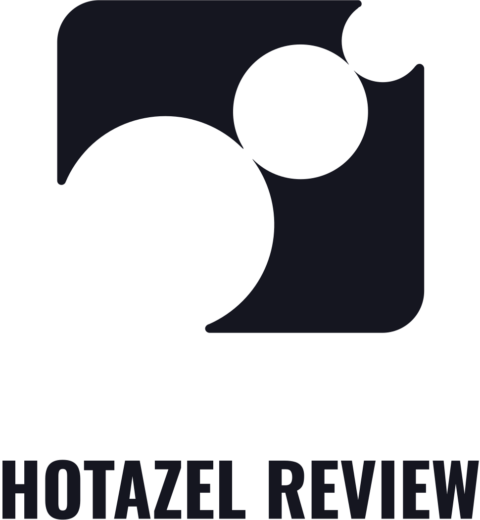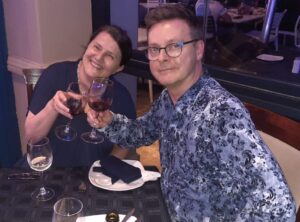
This interview is the second in the SmokeLong New Journal Series devoted to new journals around the world, especially those founded around the time of the pandemic. We are interested in how the global literary community is growing. Earlier this year I had the opportunity of meeting Linda Ann Strang, publisher and Editor-in-Chief of Hotazel Review, when I was in Gqeberha (formerly Port Elizebath) South Africa.
If you are the publisher/editor of a new journal, we’d love to talk. Contact us at editor@smokelong.com.
________________________
First of all, Linda, it was great meeting you in Gqeberha earlier this year, and thank you for your poetry collection, Star Reverse. You co-founded Hotazel Review during the pandemic in 2020. How did the journal get its name?
It was great meeting you too, and you’re welcome. Our name is a playful one. So many literary journals are named after large cities with the word ‘review’ attached. So, we decided to be ironic and associate our journal with one of the smallest, most out-of-the way villages in South Africa. Hotazel is a mining community in the Northern Cape that few people have ever heard of. Why not bring them some attention, we reckoned. The village itself was first named by inebriated British land surveyors, so the story goes, who found the region as “hot as hell”. It’s in the Kalahari Desert, after all.
 You publish a range of poetry, fiction, and non-fiction by writers from around the world, but you are also “strongly rooted in Africa”. What would you like to see more of from African writers?
You publish a range of poetry, fiction, and non-fiction by writers from around the world, but you are also “strongly rooted in Africa”. What would you like to see more of from African writers?
More experimentation, more literary level speculative writing. African, and African American, writers are producing some excellent work in those genres – think of Akwaeke Emezi’s Freshwater and Nnedi Okorafor’s Binti, to name just two – but we’re not seeing enough of that kind of writing in our submissions.
Tell us about your team.
I’m looking to recruit some readers in the near future, so watch this space. But for Issue Two we had the fabulous three lending a hand – Mabel Mnensa, Saliha Haddad, and Ikenna Okeh – all accomplished writers themselves. Mabel resides in Ireland, Saliha in Algeria, and Ikenna in Turkey, while Paula and I are in Gqeberha, South Africa. An international focus is what we’re all about. Ikenna’s latest novel Rogues of the East is a thriller; it was released earlier this year. One of Saliha’s more recent essays, ‘The Fancy House’, can be read here: https://salamanderink.com/the-fancy-house-saliha-haddad/essays/. Mabel has written a charming book for children, Kantiga Finds the Perfect Name, published by Simon and Schuster.
The art accompanying the work on Hotazel Review is stunning and is mostly, if not all, South African. Can you tell us more about these artists?
I’m obsessed with visual art, and I spend hours scrolling through artworks online. It’s also no secret that I want to promote South African visual artists as much as I can. When artists appear in our pages it’s because I love and believe in their work. Stephanie Liebetrau is a long-time friend as well as an artist I admire, so you’ll see her work regularly – she’s given me unstinting support in putting the journal together, for which I’m most grateful. I’m eclectic in my tastes, so I love the multidisciplinary, digital collage of a young artist like Richard Thomson, for instance, as much as oil on canvas, and textile art. Richard collaborates with musicians and his work is a multisensory experience, incorporating visual poetry. Many South African artists are doing exciting things. Mongezi Ncombo, for one, is producing work that is quite unlike anything else I’ve seen. But don’t take my word for it, check out their art in Hotazel Review.
When do you open next for fiction submissions, and are you open to flash?
We are scheduled to open submissions on 1 October this year, and, yes, flash fiction will be most welcome. In fact, we don’t accept any prose pieces of more than 1000 words these days.
What (South) African writers should we be reading?
Oh, I’ll be in trouble if I recommend some and not others. You can’t go wrong with the Booker prize winners and those who made the shortlists. Actually, I can’t resist mentioning Damon Galgut’s The Promise, the winner in 2021. His novel is a good introduction to South African writing, being a quick read and less heavy-hearted than some other prize-winning South African works. Of course, you should become acquainted with the South African writers in our lovely journal.
Thank you so much for the interview. It’s an honor to get attention from Smokelong Quarterly, a journal I’ve admired for many years.
_________________________
Follow Hotazel Review on Twitter: @HotazelR

 The core workshop of SmokeLong Fitness is all in writing, so you can take part from anywhere at anytime. We are excited about creating a supportive, consistent and structured environment for flash writers to work on their craft in a community. We are thrilled and proud to say that our workshop participants have won, placed, or been listed in every major flash competition. Community works.
The core workshop of SmokeLong Fitness is all in writing, so you can take part from anywhere at anytime. We are excited about creating a supportive, consistent and structured environment for flash writers to work on their craft in a community. We are thrilled and proud to say that our workshop participants have won, placed, or been listed in every major flash competition. Community works.